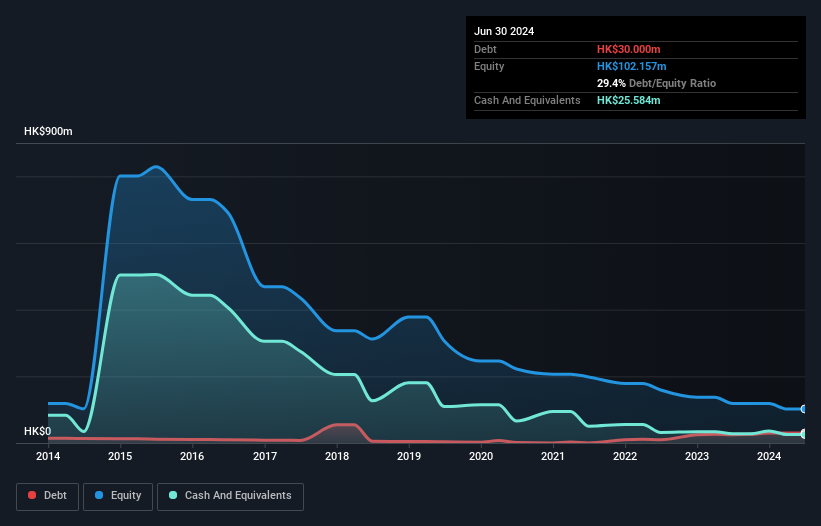- Hong Kong
- /
- Specialty Stores
- /
- SEHK:8123
Is Sinofortune Financial Holdings (HKG:8123) Using Too Much Debt?

Howard Marks put it nicely when he said that, rather than worrying about share price volatility, 'The possibility of permanent loss is the risk I worry about... and every practical investor I know worries about.' When we think about how risky a company is, we always like to look at its use of debt, since debt overload can lead to ruin. We note that Sinofortune Financial Holdings Limited (HKG:8123) does have debt on its balance sheet. But the real question is whether this debt is making the company risky.
What Risk Does Debt Bring?
Generally speaking, debt only becomes a real problem when a company can't easily pay it off, either by raising capital or with its own cash flow. In the worst case scenario, a company can go bankrupt if it cannot pay its creditors. However, a more common (but still painful) scenario is that it has to raise new equity capital at a low price, thus permanently diluting shareholders. Of course, the upside of debt is that it often represents cheap capital, especially when it replaces dilution in a company with the ability to reinvest at high rates of return. The first thing to do when considering how much debt a business uses is to look at its cash and debt together.
Check out our latest analysis for Sinofortune Financial Holdings
What Is Sinofortune Financial Holdings's Debt?
The image below, which you can click on for greater detail, shows that at June 2024 Sinofortune Financial Holdings had debt of HK$30.0m, up from HK$25.0m in one year. However, it does have HK$25.6m in cash offsetting this, leading to net debt of about HK$4.42m.

How Strong Is Sinofortune Financial Holdings' Balance Sheet?
Zooming in on the latest balance sheet data, we can see that Sinofortune Financial Holdings had liabilities of HK$128.5m due within 12 months and liabilities of HK$2.46m due beyond that. Offsetting these obligations, it had cash of HK$25.6m as well as receivables valued at HK$4.13m due within 12 months. So its liabilities total HK$101.3m more than the combination of its cash and short-term receivables.
Given this deficit is actually higher than the company's market capitalization of HK$85.2m, we think shareholders really should watch Sinofortune Financial Holdings's debt levels, like a parent watching their child ride a bike for the first time. In the scenario where the company had to clean up its balance sheet quickly, it seems likely shareholders would suffer extensive dilution. When analysing debt levels, the balance sheet is the obvious place to start. But it is Sinofortune Financial Holdings's earnings that will influence how the balance sheet holds up in the future. So when considering debt, it's definitely worth looking at the earnings trend. Click here for an interactive snapshot.
Over 12 months, Sinofortune Financial Holdings made a loss at the EBIT level, and saw its revenue drop to HK$87m, which is a fall of 58%. That makes us nervous, to say the least.
Caveat Emptor
Not only did Sinofortune Financial Holdings's revenue slip over the last twelve months, but it also produced negative earnings before interest and tax (EBIT). Its EBIT loss was a whopping HK$24m. Considering that alongside the liabilities mentioned above make us nervous about the company. It would need to improve its operations quickly for us to be interested in it. Not least because it had negative free cash flow of HK$4.4m over the last twelve months. So suffice it to say we consider the stock to be risky. There's no doubt that we learn most about debt from the balance sheet. But ultimately, every company can contain risks that exist outside of the balance sheet. These risks can be hard to spot. Every company has them, and we've spotted 1 warning sign for Sinofortune Financial Holdings you should know about.
Of course, if you're the type of investor who prefers buying stocks without the burden of debt, then don't hesitate to discover our exclusive list of net cash growth stocks, today.
New: Manage All Your Stock Portfolios in One Place
We've created the ultimate portfolio companion for stock investors, and it's free.
• Connect an unlimited number of Portfolios and see your total in one currency
• Be alerted to new Warning Signs or Risks via email or mobile
• Track the Fair Value of your stocks
Have feedback on this article? Concerned about the content? Get in touch with us directly. Alternatively, email editorial-team (at) simplywallst.com.
This article by Simply Wall St is general in nature. We provide commentary based on historical data and analyst forecasts only using an unbiased methodology and our articles are not intended to be financial advice. It does not constitute a recommendation to buy or sell any stock, and does not take account of your objectives, or your financial situation. We aim to bring you long-term focused analysis driven by fundamental data. Note that our analysis may not factor in the latest price-sensitive company announcements or qualitative material. Simply Wall St has no position in any stocks mentioned.
About SEHK:8123
Sinofortune Financial Holdings
An investment holding company, engages in the trading of motor vehicles and provision of agency services in the People’s Republic of China and Hong Kong.
Low with worrying balance sheet.
Market Insights
Community Narratives



